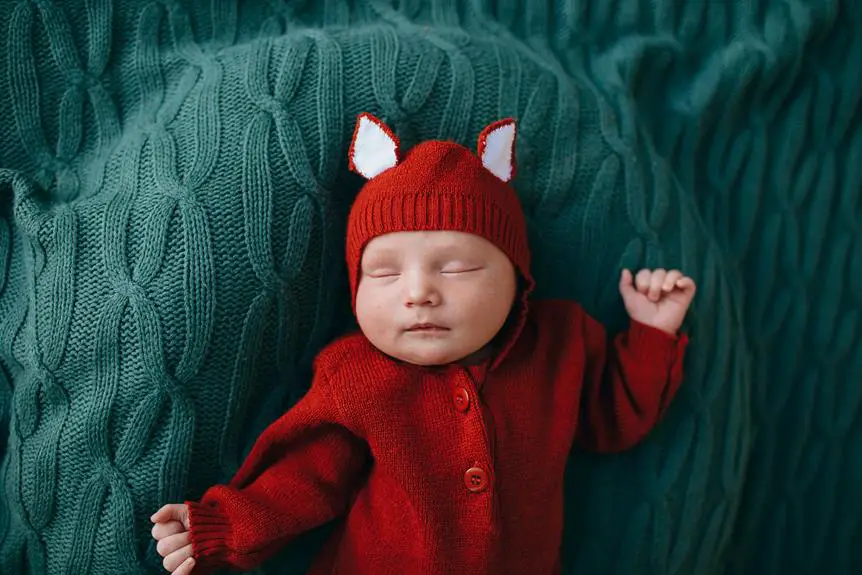When you consider bamboo fabric for your baby's clothes, you're faced with a mix of compelling benefits and notable drawbacks. Its softness and breathability can make it a go-to choice for sensitive skin, but you might also encounter issues like durability and higher costs. As you weigh these factors, it's essential to think about how bamboo compares to other fabrics and the implications of eco-friendly options. Are the advantages worth the potential trade-offs? Understanding these nuances can guide you in making an informed decision for your little one.
Table of Contents
Key Takeaways
- Bamboo fabric is exceptionally soft, making it ideal for babies with sensitive skin.
- It offers natural antibacterial properties, reducing odors and maintaining freshness.
- The breathable and moisture-wicking qualities help regulate temperature and keep babies dry.
- However, bamboo fabric may wear out faster than other materials, requiring more frequent replacements.
What Is Bamboo Fabric?
Bamboo fabric is a soft, sustainable textile made from the pulp of bamboo plants. This eco-friendly material undergoes a process where the bamboo is harvested, crushed, and processed into a viscose or rayon form. You'll find that the resulting fabric is incredibly versatile, making it ideal for a variety of clothing items, especially for babies.
The production of bamboo fabric is generally more environmentally friendly than that of cotton or synthetic fabrics, as bamboo grows rapidly and requires less water. You might appreciate that it's often produced without harmful chemicals, which is crucial for sensitive baby skin.
Additionally, bamboo fabric has natural antibacterial properties, which helps reduce odors and keeps clothes fresher for longer. Its breathability and moisture-wicking abilities make it a comfortable option for your little one, ensuring they stay dry during playtime or naptime.
When considering fabric for baby clothes, bamboo's softness and sustainability make it a strong choice. You can feel confident knowing that you're choosing a material that's not only gentle on your baby's skin but also kinder to the planet.
Benefits of Bamboo Fabric
You'll love the numerous benefits of bamboo fabric, especially when it comes to dressing your little one in comfort and style.
First off, bamboo fabric is incredibly soft, often compared to silk, which means your baby will feel cozy and comfortable all day long. This softness is perfect for sensitive skin, reducing the risk of irritation or rashes.
Bamboo fabric is also breathable, allowing air to circulate and helping to regulate your baby's temperature. This is particularly beneficial for babies who tend to get overheated. Plus, it's moisture-wicking, drawing sweat away from the skin and keeping your little one dry and comfortable.
Another great feature is bamboo's natural antibacterial properties, which can help keep odors at bay and maintain freshness, even after multiple washes.
You'll appreciate how easy it's to care for bamboo fabric, as it's durable and withstands wear and tear while retaining its shape and softness.
Drawbacks of Bamboo Fabric
While bamboo fabric offers many advantages, there are some drawbacks that parents should consider before choosing it for their baby's clothes. One significant concern is its durability. Bamboo fabric can wear out quicker than other materials, especially when subjected to frequent washing. This means you might find yourself replacing those adorable onesies sooner than expected.
Another downside is the cost. Bamboo fabric often comes with a higher price tag compared to cotton or polyester blends. For budget-conscious parents, this can be a dealbreaker when outfitting your little one.
Lastly, while bamboo is naturally hypoallergenic, the chemical process used to produce bamboo fabric can sometimes leave behind residues that could irritate sensitive skin. It's essential to look for brands that prioritize eco-friendly and safe production methods.
Here's a quick comparison of these drawbacks:
| Drawbacks | Impact on Parents |
|---|---|
| Durability Issues | Frequent replacements needed |
| Higher Cost | Strain on budget |
| Potential Irritants | Risk for sensitive skin |
Weighing these factors can help you decide if bamboo fabric is the right choice for your baby's wardrobe.
Comparisons With Other Fabrics
When considering baby clothes, it's helpful to compare bamboo fabric with other popular materials like cotton and polyester to understand their respective benefits and drawbacks.
Bamboo is known for its softness, often softer than cotton, making it gentle on your baby's sensitive skin. It also has natural antibacterial properties, which can reduce odors, an advantage over cotton that can retain smells.
On the other hand, cotton is highly breathable and absorbent, which is great for keeping your baby comfortable. However, conventional cotton often involves pesticides and chemicals during its production, raising concerns for some parents.
Polyester, while durable and resistant to wrinkles, isn't as breathable as bamboo or cotton, which can lead to overheating, especially in warmer climates.
Bamboo also stands out for its eco-friendliness, as it requires less water and is more biodegradable than polyester. However, polyester can be more affordable and easier to care for.
Ultimately, choosing between bamboo, cotton, and polyester depends on your priorities regarding comfort, environmental impact, and ease of maintenance for your baby's wardrobe.
Tips for Choosing Bamboo Baby Clothes
Consider these essential tips to ensure you choose the best bamboo baby clothes for your little one.
First, check the fabric blend. Pure bamboo is soft and breathable, but blends with other materials can affect comfort and durability. Look for clothes labeled as 100% bamboo or a high percentage of bamboo to maximize benefits.
Next, pay attention to the certifications. Look for labels like Oeko-Tex Standard 100, which ensures the fabric is free from harmful chemicals. This is crucial for your baby's delicate skin.
Also, consider the fit. Babies grow quickly, so opt for clothes that allow room for movement. Adjustable snaps or stretchy waistbands can be great choices.
Don't forget about washing instructions. Bamboo fabric often requires gentle care, so check if the clothes are machine washable and whether they can withstand frequent washing without losing softness.
Lastly, explore eco-friendly brands. Many companies focus on sustainable practices, which can align with your values as a parent.
Frequently Asked Questions
Is Bamboo Fabric Hypoallergenic for Sensitive Baby Skin?
Yes, bamboo fabric is hypoallergenic, making it great for sensitive baby skin. It's soft, breathable, and resistant to mold and bacteria, reducing irritation. You'll find it helps keep your baby comfortable and protected.
How Should I Wash Bamboo Baby Clothes?
You should wash bamboo baby clothes in cold water on a gentle cycle. Avoid bleach and fabric softeners, as they can damage the fibers. Air drying is best, but you can tumble dry on low heat.
Can Bamboo Fabric Cause Any Skin Irritations?
Bamboo fabric generally doesn't cause skin irritations, but individual sensitivities can vary. It's best to monitor your baby for any reactions. If irritation occurs, consider switching to a different material that suits their skin better.
Is Bamboo Fabric Eco-Friendly and Sustainable?
Yes, bamboo fabric's eco-friendly and sustainable. It grows quickly without pesticides, requires less water than cotton, and can be processed using environmentally friendly methods. You're making a greener choice by opting for bamboo fabric.
How Does Bamboo Fabric Compare in Price to Cotton?
When comparing bamboo fabric to cotton, you'll likely find bamboo's price can be slightly higher. However, its durability and softness often justify the cost, giving you a valuable long-term investment for your wardrobe.
- The Use of Nonwovens in Construction and Civil Engineering - July 11, 2025
- The Use of Nonwovens in Construction and Civil Engineering - July 11, 2025
- The Use of Nonwovens in Construction and Civil Engineering - July 11, 2025





